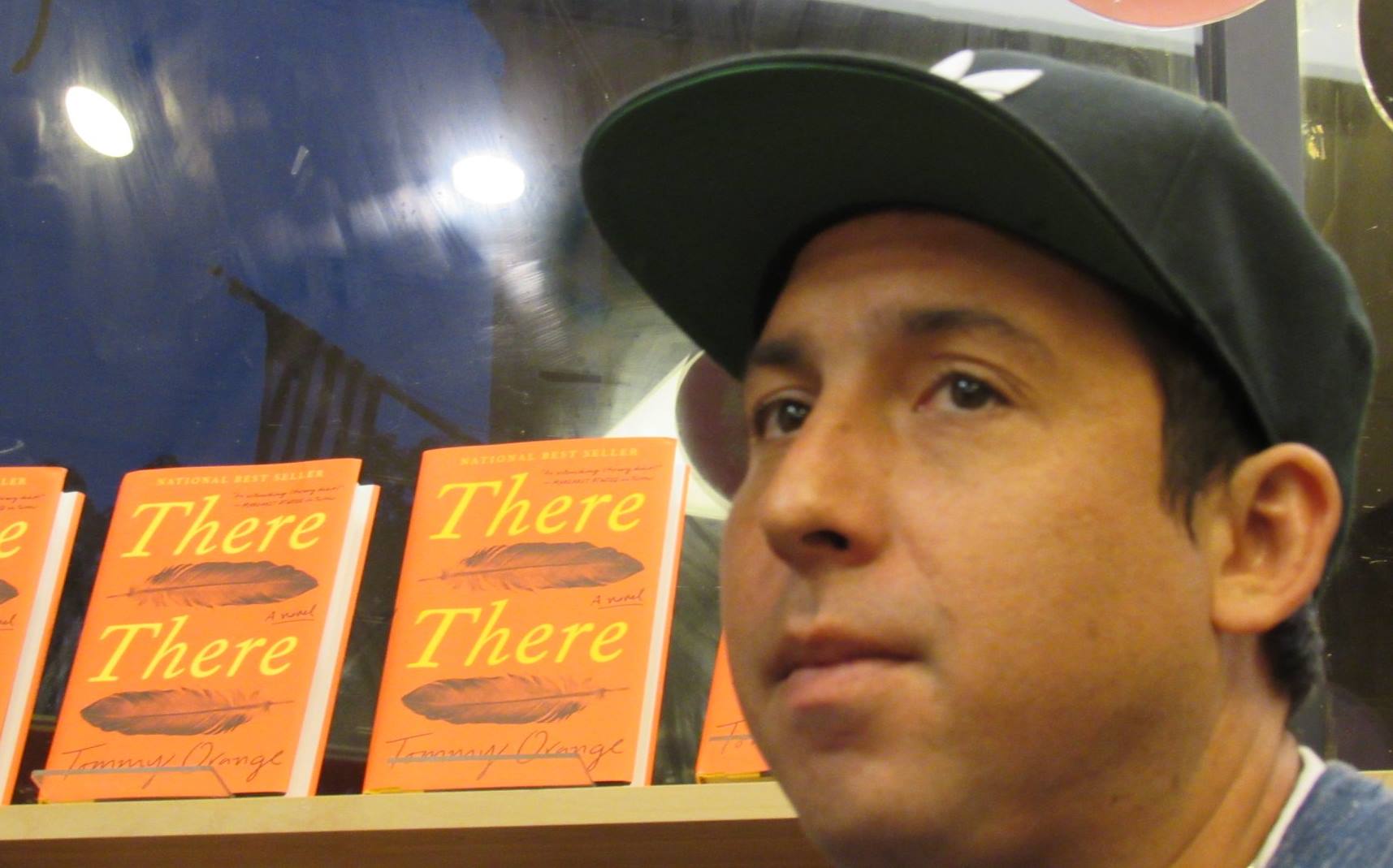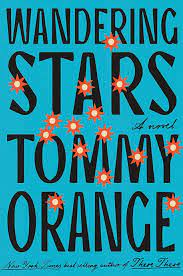
- Details
- By Elyse Wild
Author Tommy Orange (Cheyenne and Arapaho) was at a museum in Sweden promoting a Swedish translation of his novel, There, There, when a newspaper clipping on display caught his attention. It detailed the Southern Cheyenne — the tribe which Orange is a citizen of — connection to Fort Marion, which would become the government’s blueprint for Indian Boarding Schools.
“I became obsessed with finding out more,” Orange told Native News Online.
The culmination of that obsession hit the shelves last week in the form of Wandering Stars, Orange’s long-awaited second novel.
Orange exploded onto the literary scene in 2018 with his debut novel, There, There (Knopf). The book tells the story of the Bear Shield and Red Feather family as it follows a cast of Native characters living in Oakland, Calif., culminating in a haunting climax at a powwow. There, There received instant critical praise and garnered Orange a Pulitzer-prize nomination.
Both a prequel and sequel, Wandering Stars takes reader back into the lives of the Bear Shield and Red Feather family, weaving a tale of their familial line from their ancestor Star who survived the 1864 Sand Creek Massacre in Colorado to Carlisle Boarding School to the present day and the aftermath of the events in There, There.
Wandering Stars is being hailed as “a towering achievement” (Washington Post), “Outstanding . . . A dazzling work of literary fiction” (Boston Globe), and “A multilayered, blisteringly honest novel” (San Francisco Chronicle).
Orange spoke with Native News Online about his journey writing Wandering Stars while uncovering the history of the Southern Cheyenne; how the idea of seven generations shows up in the book; and how being a writer is kind of like being an athlete.
This interview has been edited for clarity and length.
How has your voice changed as a writer since There, There?
Having my characters going to one place and setting up a gun and a robbery at the beginning gives everything an urgency and a propulsive-ness that infused the first book with a certain kind of energy.
And here we slow down quite a bit and look back quite a bit, and that automatically changes the energy of the whole book.
In revising the whole piece and living with the work all these years that it took to write it, it sort of gelled into different rhythms and different tones because it's a whole different project.
And it was much harder to write this one. Even though a lot of people think success means you gain this great sense of confidence and you're able to write easier, I find that not to be true.
You've mentioned being at a museum in Sweden and seeing a newspaper clipping about Southern Cheyenne in Saint Augustine, Florida, and that kind of started the process of writing Wandering Stars. Can you tell me about that?
It was super surreal, and it was such a representation of where I think museums are right now. We know there are problems, and we're going to work as slowly as we can to fix them and keep showing off your stuff in the meantime. As soon as I saw this piece of history about us being in Florida, I was just drawn to it and found out that it was the origin story of the boarding schools. You don't hear about Southern Cheyennes even if you're studying Native history. We weren't even really at the Battle of Little Bighorn. You know, other Cheyennes were there, but that was more Northern Cheyenne.
It was just really exciting to feel like, even if the history is a really dark and devastating one, it was compelling for me to learn that we, my tribe, was there at this really important moment.
As soon as I found out that information, I became obsessed with finding out more about it and, and there's just so much interesting stuff to that history.
I tried to get as much of it as I could into the narrative into a story because there's tons of history about a lot of these things. I'm interested in trying to build compelling stories around them as opposed to just repeating historical facts.
One of the things you achieve with “Wandering Stars” is running a thread from the historical to the contemporary. Most of the contemporary issues that Native communities contend with are rooted in history. One of the things that you hear in Indian Country is the phrase "seven generations," meaning that your actions and the occurrences of today will be felt for seven generations. It really seems like “Wandering Stars” encompasses that idea. Was that on your mind at all while you were writing?
What's crazy is that I finished writing the book, counted, and was like, "Oh my God, there are seven generations here." I didn't do it consciously. It totally just kind of emerged from the process.
Wow. That just gave me chills. That's amazing.
There were a lot of moments like that where it felt like, I'm doing it, but it's something else that is happening to me. When I was doing research for the prison castle, I had already started writing a character named Star because I came up with the title Wandering Stars in 20 2018, when I first started writing the sequel before I went to Sweden.
And, I see this list of names, and I don't really know how this historical piece is going to tie in with the sequel that I was already writing, and I see this list of prisoners, and one of them is named Star and another one is Bear Shield. I read that and I just started crying.
That's the universe telling you this is what you're supposed to be doing.
Exactly. From there, I knew it was a family line that we were going to follow all the way from Sand Creek to the aftermath of “There, There.”
One of the things that your work does is challenge readers to engage with a very real and contemporary picture of Indian country, which in a literary sense is breaking new ground. Is that something you set out to do?
No. I wanted a job at my school and my MFA. I'm a skeptical person and have a lot of self-doubt. And I thought it might be realistic to publish somewhere and have my job be about writing, working with students. And I loved the MFA program experience. I had no big goals or visions of me going off to do anything on a big scale. It's all been crazy.
There is this wave of Native creatives crashing over mainstream America right now: Sterlin Harjo, Lily Gladstone, Quannah Chasing Horse, and you as well. How do you hope to inspire young Native writers? What advice would you give them?
I was self-taught for the first nine years of writing. Before I went to the MFA, I was working in the Native community. I came to writing late, and I had a lot of catching up to do.
I come from first being an athlete and a musician. This is a very long way to answer your question, but both of those things have built into it — putting in the time like it's a discipline. I took that same idea to writing. I knew I needed to put in the time, so I found ways and continued to find ways to work regardless of how I felt.
Find ways to keep working and to make it a discipline and not slip into this idea of 'I either have writer's block or I'm not inspired.' Because that's not that's not a place you can work from. That's a place where you're waiting to see how you feel that day.
Bringing this discipline element to writing is like becoming really good at the free throw. How do you do that? Figure out the free throw for writing — where can you continually shoot from? You can write sentences that other authors have written and study them. There are all sorts of ways that you have to set yourself up to keep working and to keep it a discipline.
Is there a character in this world you've created that really resonates with you?
They all depend on me pulling from the interior. I have a lot of interior writing going on with this book, and a lot of that interior life comes directly from me. There, I could point to Thomas Frank or Dene Oxendine, where I pulled from certain life events and wrote about them through those characters.
This time around, it's a little bit different. Instead of sort of life events, I'm pulling a lot of my feelings and my thoughts and my fears and all these different interior places, if that makes sense.
It does. It does. What do you hope that readers carry with them from “Wandering Stars” after they’ve finished reading it?
I hope readers gain something that's helpful. That's not always possible with a work of fiction. Sometimes you're just wanting to escape. I do hope that's helpful in their lives, whatever that means.
Writing is an exercise in isolation. How do you stay grounded or connected to yourself while you're writing?
It could be argued that I don't! I run a lot. It's actually part of the writing process for me. I think of stuff when I'm running that I can't think of when I'm writing. That's crucial to figuring stuff out.
More Stories Like This
Vision Maker Media Honors MacDonald Siblings With 2025 Frank Blythe AwardFirst Tribally Owned Gallery in Tulsa Debuts ‘Mvskokvlke: Road of Strength’
Zuni Youth Enrichment Project and Partners at Ho’n A:wan Productions Launch 8th Annual Delapna:we Project
Chickasaw Holiday Art Market Returns to Sulphur on Dec. 6
Center for Native Futures Hosts Third Mound Summit on Contemporary Native Arts
Help us defend tribal sovereignty.
At Native News Online, our mission is rooted in telling the stories that strengthen sovereignty and uplift Indigenous voices — not just at year’s end, but every single day.
Because of your generosity last year, we were able to keep our reporters on the ground in tribal communities, at national gatherings and in the halls of Congress — covering the issues that matter most to Indian Country: sovereignty, culture, education, health and economic opportunity.
That support sustained us through a tough year in 2025. Now, as we look to the year ahead, we need your help right now to ensure warrior journalism remains strong — reporting that defends tribal sovereignty, amplifies Native truth, and holds power accountable.
 The stakes couldn't be higher. Your support keeps Native voices heard, Native stories told and Native sovereignty defended.
The stakes couldn't be higher. Your support keeps Native voices heard, Native stories told and Native sovereignty defended.
Stand with Warrior Journalism today.
Levi Rickert (Potawatomi), Editor & Publisher


